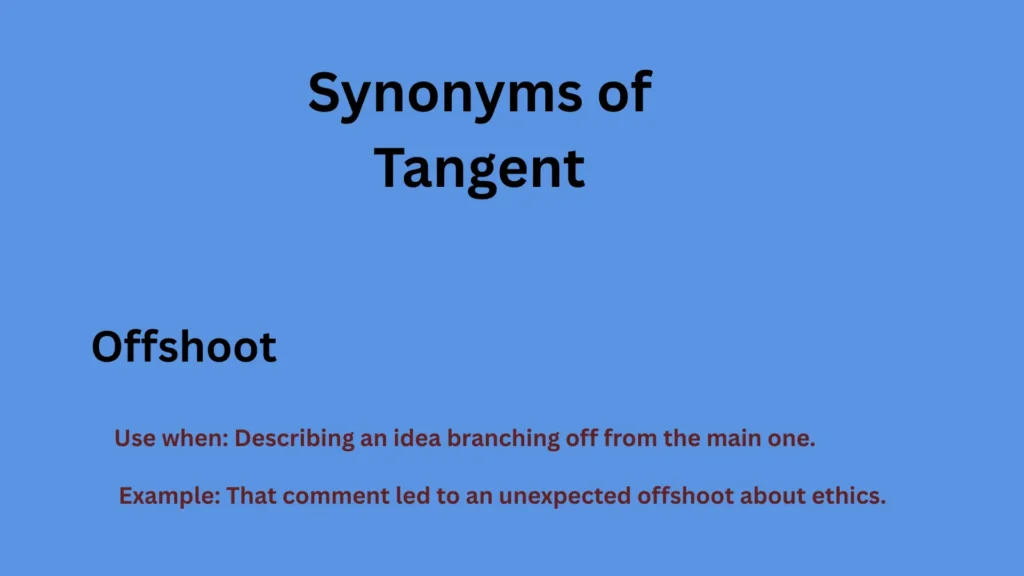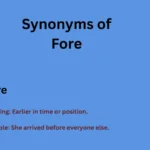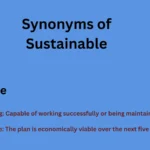Synonyms of Tangent, such as digression, aside, and divergence, offer clearer and more relatable ways to describe when a conversation or thought strays from the main topic. If you find the word “tangent” too technical or want alternatives that fit different tones and contexts, this article provides 30 carefully selected tangent synonyms.
Each synonym for Tangent comes with a clear meaning, an example sentence, and tips on when to use it—whether in casual chats, formal writing, or storytelling.
These words help you describe moments when discussions veer off track with precision and style. If you’re analyzing a debate, writing an essay, or simply chatting, you’ll find the perfect synonym to express that detour smoothly.
Synonyms of Tangent Examples
1. Digression
Use when: You want a formal or academic alternative.
Example: Her speech included a short digression about her childhood.
Tone: Neutral to formal.
2. Side Note
Use when: You’re speaking casually or adding quick extra info.
Example: Side note: The original author was only 19!
Tone: Casual and conversational.
3. Offshoot
Use when: Describing an idea branching off from the main one.
Example: That comment led to an unexpected offshoot about ethics.
Tone: Neutral; good for creative or brainstorming settings.
4. Aside
Use when: You want a theatrical or editorial tone.
Example: As an aside, did you know the director used to be an actor?
Tone: Literary, often witty or reflective.
5. Deviation
Use when: Highlighting a clear break from the expected direction.
Example: This chapter marks a major deviation from the main plot.
Tone: Formal or analytical.
6. Sidetrack
Use when: Implying someone was distracted or lost focus.
Example: We got sidetracked talking about our vacation plans.
Tone: Informal and slightly playful.
7. Detour
Use when: Referring to a purposeful redirection.
Example: Let’s take a quick detour into how the policy evolved.
Tone: Thoughtful, slightly strategic.
8. Byway
Use when: Evoking a poetic or meandering tone.
Example: He explored the byways of ancient mythology in his lecture.
Tone: Literary or reflective.
9. Diversion
Use when: The change in topic feels deliberate or entertaining.
Example: His joke was a welcome diversion from the tense meeting.
Tone: Playful or lighthearted.
10. Meander
Use when: The topic shift is slow or wandering.
Example: Her thoughts meandered into memories of college.
Tone: Reflective, nostalgic.
11. Excursion
Use when: Describing an enjoyable or unexpected side path.
Example: It was a brief intellectual excursion into marine biology.
Tone: Positive, often intellectual.
12. Branch
Use when: Illustrating how ideas grow or split off.
Example: Let’s return to the main branch of this argument.
Tone: Neutral, logical.
13. Interjection
Use when: Inserting something briefly into an ongoing thought.
Example: He made an interjection about taxes before we moved on.
Tone: Formal to technical.
14. Distraction
Use when: Emphasizing loss of focus or relevance.
Example: All these graphics are a distraction from the real message.
Tone: Slightly critical.
15. Breakaway
Use when: A stronger, possibly emotional departure from the topic.
Example: That was a sudden breakaway from the usual theme.
Tone: Dramatic, unexpected.
16. Wander
Use when: Reflecting a mental drift.
Example: My thoughts wandered during his long explanation.
Tone: Casual, introspective.
17. Parenthesis
Use when: Referencing extra info slipped into the main flow.
Example: He added a quick parenthesis about his dog.
Tone: Literary or editorial.
18. Footnote
Use when: Information is not central but adds value.
Example: That fact felt like a footnote in the broader story.
Tone: Scholarly or witty.
19. Sidebar
Use when: Temporary departure that supports the main discussion.
Example: Let’s do a quick sidebar on tax law changes.
Tone: Conversational, sometimes legal or professional.
20. Anomaly
Use when: The shift is strange or doesn’t fit.
Example: This theory is an anomaly in the current literature.
Tone: Analytical or critical.
21. Interlude
Use when: Referring to a pause or change of pace.
Example: The flashback served as a lyrical interlude in the narrative.
Tone: Artistic or rhythmic.
22. Loop
Use when: You return to the original point eventually.
Example: Let me loop back to what I was saying earlier.
Tone: Casual, professional.
23. Outlier
Use when: Describing an idea far outside the norm.
Example: That story is an outlier compared to his other works.
Tone: Statistical or analytical.
24. Spinoff
Use when: The side topic develops into its theme.
Example: This article is a spinoff from a larger research paper.
Tone: Business, media, or creative.
25. Ramble
Use when: You want a slightly critical or humorous tone.
Example: Sorry, I tend to ramble when I get excited.
Tone: Informal and self-aware.
26. Drift
Use when: The move is slow and possibly unnoticed.
Example: Our discussion drifted toward politics.
Tone: Subtle, casual.
27. Off-topic
Use when: Calling out irrelevance.
Example: That’s a bit off-topic, but still interesting.
Tone: Neutral to critical.
28. Interruption
Use when: The tangent breaks flow abruptly.
Example: His interruption about the budget confused the room.
Tone: Neutral to slightly negative.
29. U-Turn
Use when: The discussion shifts sharply.
Example: That argument was a complete U-turn from his usual stance.
Tone: Playful, sometimes sarcastic.
30. Rabbit Hole
Use when: The topic leads to deeper, endless details.
Example: That question led us down a rabbit hole of internet trivia.
Tone: Curious, playful, slightly obsessive.
How to Choose the Right Synonym for “Tangent”
Choosing the right alternative depends on tone, context, and intent. Here’s a quick guide:
| Tone | Best Synonyms |
| Formal/Academic | Digression, Deviation, Interjection |
| Casual/Conversational | Side Note, Ramble, Drift, Loop |
| Creative/Literary | Excursion, Meander, Interlude, Byway |
| Critical | Off-topic, Distraction, Interruption |
| Playful/Quirky | Rabbit Hole, Detour, Spinoff, U-Turn |
| Reflective/Thoughtful | Aside, Wander, Parenthesis, Footnote |
Cultural note: In American English, terms like “rabbit hole” and “side note” are especially common in internet or informal writing. “Digression” and “excursion” are more frequently used in essays, lectures, or podcasts.
Conclusion: Mastering Tangents and Their Synonyms
Using synonyms for “tangent” can sharpen your writing and make your conversations more expressive. Whether you’re describing a casual drift in thought or an intentional digression in an academic essay, the right word can clarify your message and tone.
By learning the subtle differences between terms like “aside,” “rabbit hole,” and “detour,” you’ll better navigate the twists and turns of language. Use these synonyms wisely to keep your audience engaged—even when you take them on an unexpected journey.


